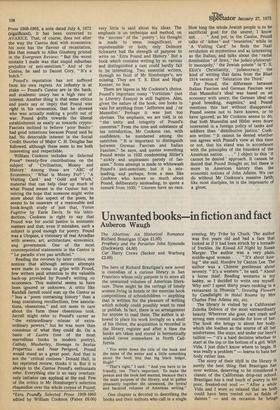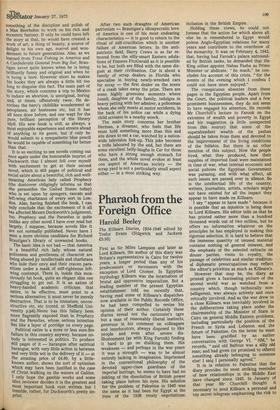Unwanted books in fiction and fact
Auberon Waugh
The Abortion: An Historical Romance Richard Brautigan (Cape £1.95) Prophecy and the Parasites John Symonds (Duckworth £4.80) Car Harry Crews (Secker and Warburg £2.00) The hero of Richard Brautigan's new novel is custodian of a curious library in San Francisco whose only purpose is to store all the unwanted volumes of American literature. These might be the ravings of lonely women living in hotels or the exercise book compositions of schoolchildren — anything that is written for the pleasure of writing which nobody could possibly want to read or publish. In fact, there is no arrangement for anyone to read them. The author is allowed to place his work lovingly on a shelf of his choice, the acquisition is recorded in the library register and after a time the books are taken and stored in hermetically sealed caves somewhere in North California.
"You write down the title of the book and the name of the writer and a little something about the book into that big black ledger, Hugh?"
"That's right," I said. "And you have to be friendly, too. That's important. To make the person and the book feel wanted, because that's the main purpose of the library, and to gather pleasantly together the unwanted, the lyrical and haunted volumes of American writing."
One chapter is devoted to describing the books and their authors who call in a single evening. My Trifte by Chuck. The author was five years old and had a face that looked as if it had been struck by a tornado of freckles. He Kissed All Night by Susan Margar. The author was a very plain, middle-aged woman . . . " It's about kissing" she said. Hombre by Canton Lee. The author was a Chinese gentleman about seventy. "It's a western ", he said. "About a horse thief. Reading westerns is my hobby, so I decided to write one myself. Why not? I spent thirty years cooking in a restaurant in Phoenix ". Growing Flowers by Candlelight in Hotel Rooms by Mrs Charles Fine Adams etc, etc.
The library is visited by a Californian Zuleika Dobson of the most extraordinary beauty. Wherever she goes, cars crash and strong men commit suicide for love of her. The book she brings is about her body, which she loathes as the source of all her misfortunes. She stays, and under our hero's tuition — "it's a hard decision whether to start at the top or the bottom of a girl. With Vida, I just didn't know where to begin. It was really a problem" — learns to hate her body rather less.
The story of their idyll in the library is surely the best thing that Brautigan has ever written, deserving to be considered a classic of the Californian drop-out school.
Brantigan has a real touch of poetry in his poor, freaked-out soul — "After a while Vida and I were so relaxed that we both could have been rented out as fields of daisies " — and on occasion he brings something of the discipline and polish of a Max Beerbohm to work on his rich and eccentric fantasy. If only he could have left the story at that, he would have created a work of art, a thing of beauty, a source of delight to his own age, marvel and wonderment to future generations. Alas, as we learned from Trout Fishing in America and A Confederate General from Big Sur, Brautigan never quite knows when he is being brilliantly funny and original and when he is being a bore. However short he makes his books they are always a little bit too long to disguise this fact. The main part of the story, which concerns a trip to Mexico to induce an abortion, is unoriginal, boring and, at times, offensively twee. He describes the hero's childlike wonderment at aeroplanes, air hostesses etc, but it has all been done before, and one wept for the Pure, brilliant perception of the library idyll. His new book is still, as always, a most enjoyable experience and streets ahead of anything in its genre, but if only he would submit to a sympathetic blue pencil he would be capable of something far better than that.
It is so exciting to see novels coming out once again under the honourable imprint of Duckworth that I almost fell over myself With excitement to get at their second novel, which is 403 pages of political and social satire about a beautiful, rich and wellmeaning American lady called Prophecy (the dustcover obligingly informs us that She personifies the United States today) Who is set upon by spongers, rascals and left-wing charlatans of every sort in London. Alas, having finished the book, I can only conclude that the excitement of it all has affected Messrs Duckworth's judgement, too. Prophecy and the Parasites is quite unlike any other novel I have ever read but largely, I suppose, because novels like it are not normally published. Never have I seen a more obvious candidate for Richard Brautigan's library of unwanted books.
The basic idea is not bad — that America IS a beautiful rich lady whose natural Politeness and gentleness of character are being abused by intellectuals and charlatans Who hide their envy and their craven parasitism under a mask, of self-righteous leftWing contempt. There is, inside this monstrously fat book, quite an elegant slim one struggling to get out. It is an axiom of heavy-handed academic criticism that satire, to be effective, must point to a serious alternative; it must never be merely destructive. That is to be immature, unconstructive etc, etc (contd. at Sheffield University p.94).Never has this fallacy been more flagrantly exposed than in Prophecy and the Parasites, whose serious intention lies like a layer of porridge on every page. Political satire is a more or less sure-fire failure in this country anyway, because nobody is interested in politics. To produce 403 pages of it — harangue after satirical harangue, with very little action in between and very little wit in the delivery of it — at the amazing price of £4.80, by a littleknown author, shows the sort of optimism Which may have been justified in the case Of Christ walking on the waters of Galilee. I only hope the gamble works and some Idiot reviewer decides it is the greatest and most important book ever written but I tremble, rather, for Duckworth's pretty imprint. After two such draughts of American patriotism — Brautigan's idiosyncratic love of America is one of his most endearing characteristics — it is good to return to the ritual of self-crucifixion which is another failure of American letters. In the antipatriotic field, Harry Crews is as far removed from the silly-smart Eastern adulations of Frances FitzGerald as it is possible to be, but both are filled with the same disgust at their civilisation. Car is about a family of scrap dealers in Florida who specialise in buying newly-wrecked cars for scrap — the first dealer on the scene of a crash takes away the prize. There are some highly gruesome moments where June11, daughter of the family, indulges in heavy petting with her admirer, a policeman whom she only meets at motor accidents, in the back of his police car while a dying child screams in a nearby wreck.
The main story concerns her brother Herman, a dreamer, who feels that life must hold something more than this and sits down to eat a car, watched by a nationwide television link-up. This joke becomes a trifle laboured by the end, but there are some excellent belly-laughs in Car for those who have a strong enough stomach for them, and the whole novel evokes at least one aspect of American society — the scrap yard is not a particularly small aspect either — in a most striking way.



































 Previous page
Previous page